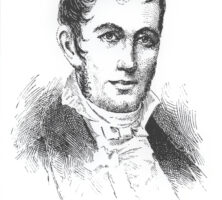Justly called “a man of many talents” and “something of a renaissance man,” Oliver H. Prince served in the Georgia General Assembly and the U.S. Senate, was instrumental in bringing railroads to Georgia, wrote the first great law book by a Georgian, laid out the streets of one of Georgia’s major cities, and penned a short story so brilliantly amusing that it was plagiarized by the novelist Thomas Hardy.
Early Life
Oliver Hillhouse Prince was born in Montville, Connecticut, on July 31, 1782, the third child of Mary Hillhouse and William Prince Jr. In 1796 Prince moved with his family to Washington, in Wilkes County. There, he attended a local “Latin and Grammar” school; he may also have studied for a while in a small schoolhouse in Montville. He had no other formal schooling.

Courtesy of Hargrett Rare Book and Manuscript Library, University of Georgia Libraries.
In the early 1800s Prince wrote humorous sketches for the Monitor, a Wilkes County newspaper edited by Sarah Hillhouse, who was the first woman editor in the state as well as Prince’s aunt. One of those witty pieces, untitled and published anonymously on June 6, 1807, was a satirical account of the efforts of a Captain Clodpole to drill an inept detachment of Georgia militia. Hugely popular, the sketch was reprinted many times in other newspapers and even translated into foreign languages. It also appeared in Augustus Baldwin Longstreet’s Georgia Scenes (1835). In one of the most blatant examples of plagiarism ever committed by a great writer, English author Thomas Hardy lifted a 260-word passage from Prince’s militia sketch and inserted it into the twenty-third chapter of his novel The Trumpet-Major (1880).
Career
In 1806 Prince was admitted to the bar, and for the next twenty-six years he had a lucrative law practice. In 1810 he built a white-columned house at Liberty and Pope streets in Washington. Now known as Poplar Corner, the magnificent house still stands. In 1817 he married eighteen-year-old Mary Ross Norman of Lincoln County. The couple had five children, the first two of whom died in infancy.
In 1819 the General Assembly commissioned Prince to prepare a digest of all Georgia statutes then in force, and in 1822 he published A Digest of the Laws of the State of Georgia. The book reprinted all nonlocal statutory provisions then in effect in Georgia, with the various statutes grouped together under sixty-four titles alphabetically arranged, beginning with “Affirmation” and ending with “Western Territory.” The Digest also contained explanatory notes, a list of repealed statutes, and an authoritative discussion of the writ of habeas corpus. The Digest was the first legal classic authored by a Georgian. A second edition was published posthumously in 1837.
In 1822 the Princes moved to Bibb County, and the following year Prince was one of five commissioners who selected the site and platted the streets of Macon. He bought a lot at Fifth and Plum streets and opened a law office there. In 1824 he served in the General Assembly as a state senator, and in 1828 the legislature elected him to fill the unexpired term of U.S. senator Thomas W. Cobb, who had resigned. Prince served in the Twentieth Congress from November 1828 until March 1829.
In 1831 Prince presided over the state’s first railroad convention, in Eatonton, which met to devise a plan for bringing railroads to Georgia. He was one of the first stockholders and directors of the Georgia Railroad Company.
After residing in Bibb County for a decade, Prince gave up the practice of law in 1832 and moved to Milledgeville, where he purchased and edited an influential newspaper, the Georgia Journal. In 1835 Prince sold the newspaper and retired. The following year he moved to Athens, where he had recently purchased a 450-acre farm. He lived there for only 16 months, from February 1, 1836, the day of his arrival, until May 25, 1837, the day he departed on a journey to the North to arrange for publication of the new edition of his Digest. On October 9, 1837, while on their way back to Athens, Prince and his wife were lost at sea off Ocracoke Island, North Carolina, when the steam packet they were aboard foundered after entering the path of Racer’s Storm, one of the most monstrous hurricanes of the century. A cenotaph for Oliver and Mary Prince was erected by their children in Rose Hill Cemetery in Macon. Although it has fallen over and lies face-up, the cenotaph remains in the family plot of their daughter Sarah Virginia (Prince) Green.
Prince was a trustee of the University of Georgia, and after their deaths a memorial service for him and his wife was held in the University Chapel. Prince Avenue in Athens and Prince Street in Macon are named after Oliver Prince.






